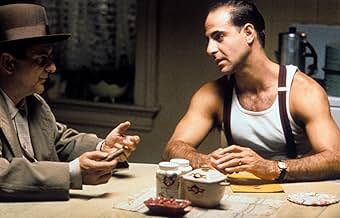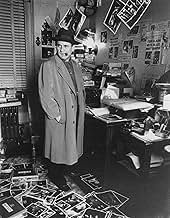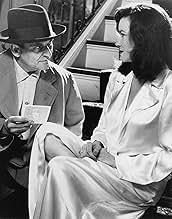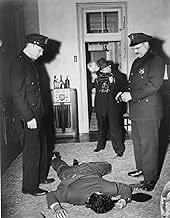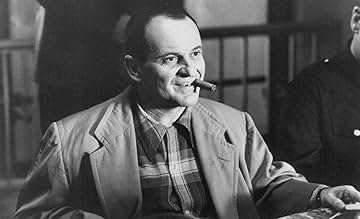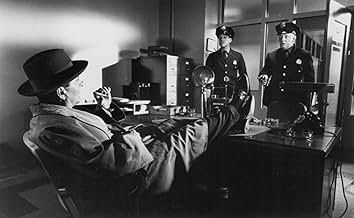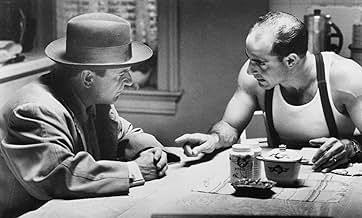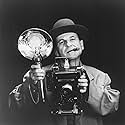IMDb RATING
6.5/10
4.7K
YOUR RATING
In the early 1940s, an infamous New York paparazzo gets an assignment from a club owner to do a background search on a mysterious gangster, which leads him down a very dangerous path.In the early 1940s, an infamous New York paparazzo gets an assignment from a club owner to do a background search on a mysterious gangster, which leads him down a very dangerous path.In the early 1940s, an infamous New York paparazzo gets an assignment from a club owner to do a background search on a mysterious gangster, which leads him down a very dangerous path.
- Awards
- 1 nomination total
Christian Stolte
- Ambulance Attendant
- (as Christian Stolti)
Gian-Carlo Scandiuzzi
- Maitre D' - Cafe Society
- (as Gian-Carlo Scanduzzi)
- Director
- Writer
- All cast & crew
- Production, box office & more at IMDbPro
Featured reviews
I appreciate that this film was more than a homage to film noir but actually advanced the genre to include populist themes and even women's issues. In many ways, this is film brun because so much effort is made to evoke the brown tones of the time which brought a warmer, less paranoid tone to the proceedings. Brown can be earthy or rich. Men wear brown suits and hats and chew on brown cigars. The nightclub is paneled in rich brown wood. Kay Levitz has brown hair. The script and direction showed a love for the time but a cynicism, too, of government collusion with organized crime to make money at the expense of the fighting men and the citizens during a time of war. I enjoyed the relationships between the characters and was touched by the pan of the cheering crowd of real people at the end, not usually seen in noir. To add to the comments about the actors: I also enjoyed Jerry Adler as Bernzini's friend and was intrigued by Jared Harris's Danny the Doorman.
I picked this up at the local grocery never having heard about it before, I thought it was a comedy, it is not. Joe Pesci scores one for the little guy that nobody likes in a big way. There is one confusing thing however. Was that Walter Winchell he was supposed to be friends with? That part confused me. There was also something said about the American mob families working with the Italian mob families to overthrow Italy in the movie era 1942. Was that true? Over all I really enjoyed it and for once could not predict the outcome. If you want something a little different, this is it.
The Private Eye (1992)
This is a fictionalized story of the very real NYC crime photographer Weegee, and if you've seen pictures of Weegee or heard his story, Joe Pesci is the perfect cast for the role, coming right after "Goodfellas." He nails it, a terrific performance, even down to handling the cameras well.
Too bad the rest of the film is hit or miss. Maybe on the hit (good) side is the general set design and atmosphere. It feels like a slightly simplified and cleaned up 1942 Manhattan (where most or all of this occurs). And Barbara Hershey as the leading woman (not quite a femme fatale, it seems, but she has that look) is solid, especially with her hair up. You'll see, a good strong look. And the cameras are pretty right on (I'm a photographer, and I shoot with one of these 4x5 Graflex press cameras all the time), though at a glance it seemed that at least one of his Graflexes was a post-war model. We'll let that slip. And on the plus side it has to be said that Mark Isham's last minute hiring for the score was inspired, because it gives the movie the depth it needs.
The misses on the film are deeply integral to enjoying it all the way--the plot, the secondary actors, the direction. The latter is hard to pin down within the obvious and almost purposely clichéd plot, but you feel all along that the movie is put together functionally, as if the director knows most of all that these pieces have to go in order. But giving it flow, elegance, power, and even a convincing mise-en-scene is not just a matter of logic. It feels off, as it out of tune. It's especially noticeable because so much of the film is going right, including Pesci.
There is the question of why did they take Weegee (a.k.a. Arthur Fellig) and turn him into Bernzini (a.k.a. Leon Bernstein)--apparently it was a rights issue with the original story, but certainly the new story could have still been based on Weegee. The images in the film look like pseudo-Weegee moments as much as Pesci looks like Weegee, and Wikipedia says that some of these are actual Weegees. (I have my doubts, but who knows?) Both men had outrageous rubber stamps for the back of their prints that are almost identical--Weegee's said "Weegee the Great." The car is identical, for sure, and even the pace and the world are Weegee's.
Beyond all of this, the movie is entertaining if never commanding, and quite beautifully photographed--I'm talking the cinematography, now. My copy was VHS, and it doesn't sound like the DVD service through Amazon called the Universal Vault Series has very high standards (one user said it looked like VHS quality). I would think a full widescreen version would be worth the trouble--maybe try an Amazon instant play for $3. This says specifically that it is widescreen.
This is a fictionalized story of the very real NYC crime photographer Weegee, and if you've seen pictures of Weegee or heard his story, Joe Pesci is the perfect cast for the role, coming right after "Goodfellas." He nails it, a terrific performance, even down to handling the cameras well.
Too bad the rest of the film is hit or miss. Maybe on the hit (good) side is the general set design and atmosphere. It feels like a slightly simplified and cleaned up 1942 Manhattan (where most or all of this occurs). And Barbara Hershey as the leading woman (not quite a femme fatale, it seems, but she has that look) is solid, especially with her hair up. You'll see, a good strong look. And the cameras are pretty right on (I'm a photographer, and I shoot with one of these 4x5 Graflex press cameras all the time), though at a glance it seemed that at least one of his Graflexes was a post-war model. We'll let that slip. And on the plus side it has to be said that Mark Isham's last minute hiring for the score was inspired, because it gives the movie the depth it needs.
The misses on the film are deeply integral to enjoying it all the way--the plot, the secondary actors, the direction. The latter is hard to pin down within the obvious and almost purposely clichéd plot, but you feel all along that the movie is put together functionally, as if the director knows most of all that these pieces have to go in order. But giving it flow, elegance, power, and even a convincing mise-en-scene is not just a matter of logic. It feels off, as it out of tune. It's especially noticeable because so much of the film is going right, including Pesci.
There is the question of why did they take Weegee (a.k.a. Arthur Fellig) and turn him into Bernzini (a.k.a. Leon Bernstein)--apparently it was a rights issue with the original story, but certainly the new story could have still been based on Weegee. The images in the film look like pseudo-Weegee moments as much as Pesci looks like Weegee, and Wikipedia says that some of these are actual Weegees. (I have my doubts, but who knows?) Both men had outrageous rubber stamps for the back of their prints that are almost identical--Weegee's said "Weegee the Great." The car is identical, for sure, and even the pace and the world are Weegee's.
Beyond all of this, the movie is entertaining if never commanding, and quite beautifully photographed--I'm talking the cinematography, now. My copy was VHS, and it doesn't sound like the DVD service through Amazon called the Universal Vault Series has very high standards (one user said it looked like VHS quality). I would think a full widescreen version would be worth the trouble--maybe try an Amazon instant play for $3. This says specifically that it is widescreen.
I was stunned by this movie when I saw it, because I'd never heard of it before and it was so excellent. Joe Pesci puts in possibly the best performance of his career, far different than many of his other roles (in other words, he doesn't play a little angry, cursing mobster). Another great actor, Barbara Hershey, also puts in a great performance. The film is directed with subtle but powerful artistry. There are actually themes in this movie! Metaphors! Basically, it's just plain great, but of course totally overlooked because it's not your typical overdone Hollywood film. My favorite scenes are these: the part in the middle of the gun battle when Pesci's character gets a gun pointed at his head, but can only respond by lifting up his camera and taking a picture, and the very final scene when Pesci's buddy tries to turn off his police scanner and he says, "You can't turn it off." A great film.
Movies should be able to transport you to the time and place without much effort. "The Public Eye" does so. I saw this in -- of all places -- a redeye bus trip from New York to DC, and this only enhanced the viewing enjoyment. This is definitely a movie to "get into the mood" for 40's noir, down to the gritty life of the City After Dark.
This one keeps getting overlooked as one of the best of the 90's. See this one.
This one keeps getting overlooked as one of the best of the 90's. See this one.
Did you know
- TriviaIt took Howard Franklin 10 years before he could get his screenplay turned into a film.
- GoofsWhen Kay leafs through Bernstein' photo album, there is picture of a New York City taxi with a rectangular roof light which displays not only the word "Taxi" but also whether the taxi is off duty and its medallion number. Those signs did not come into service until the 1960s. In the 1940s, when the movie is set, New York City taxis used a variety of curved roof lights used in most other cities.
- Quotes
Kay Levitz: It doesn't matter what people say unless you believe them.
- SoundtracksYou Can't Say No to a Soldier
(1942)
Music by Harry Warren
Lyrics by Mack Gordon
Performed by Sammy Kaye and His Orchestra
Courtesy of Sandy Hook Records
- How long is The Public Eye?Powered by Alexa
Details
Box office
- Budget
- $15,000,000 (estimated)
- Gross US & Canada
- $3,067,917
- Opening weekend US & Canada
- $1,139,825
- Oct 18, 1992
- Gross worldwide
- $3,067,917
- Runtime1 hour 39 minutes
- Color
- Aspect ratio
- 1.85 : 1
Contribute to this page
Suggest an edit or add missing content



